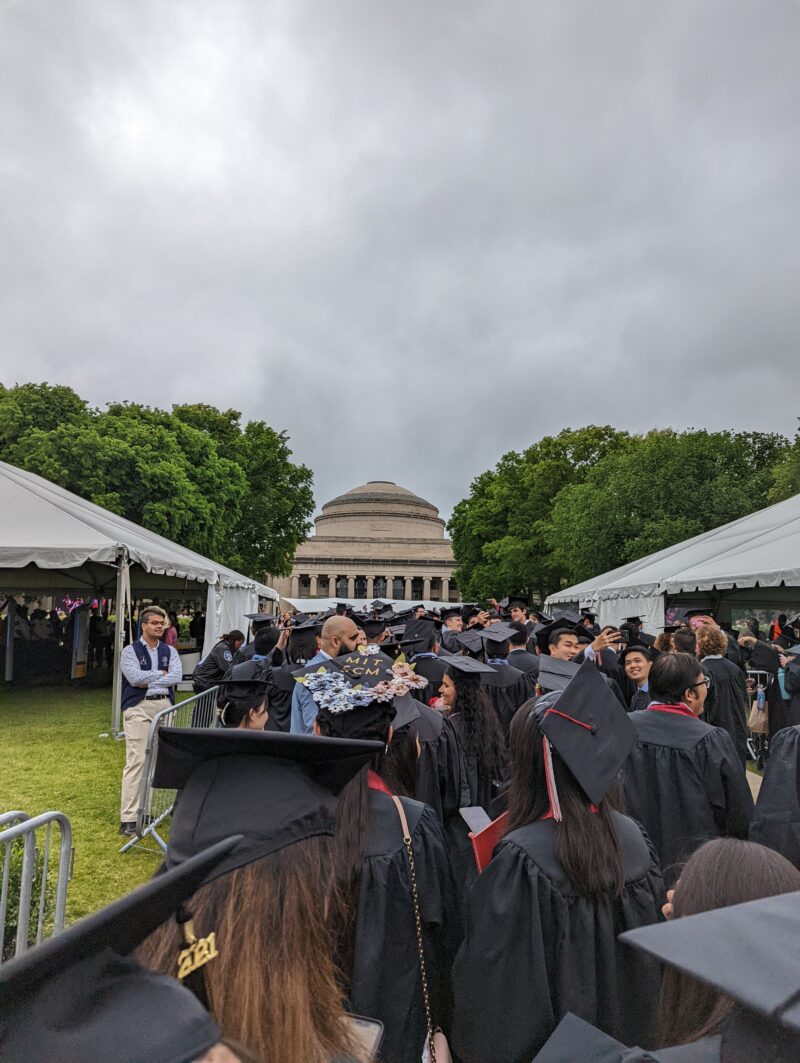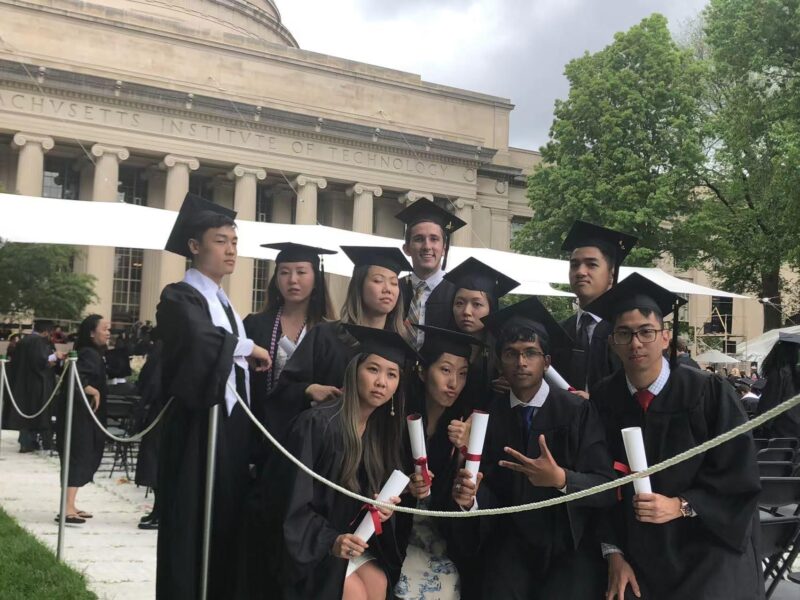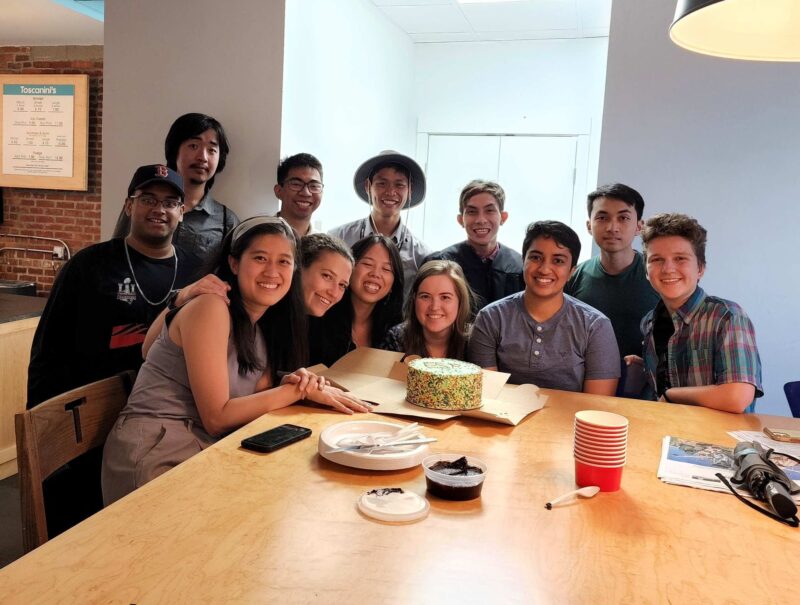motivation
On the fourth floor of E52,01 there is exactly one men’s restroom. It has two sinks, one urinal, and two toilets, and as 80 people have offices on that floor, it’s not exactly under-used.
Back in April, one of the paper towel dispensers stopped working. Something was wrong with the motor, and when you put your hand in front of it, it’d churn out a piece of paper at about a fifth of the normal rate.
Video Player
00:00
00:13
I knew there were things I could easily do about this — call FIX-IT02 , submit a work order request, or just let anyone know about the problem. But I didn’t. Almost every time I left the bathroom, the thought of calling FIX-IT immediately left my brain. And the times I did hold onto that thought, I was always too busy with something else to do it right that second.
It took about a month for it to be fixed.
For three straight weekends in June, I went on hikes. My road trip last summer was my first time doing “real” hiking, and this summer, I’ve been exploring some of the nature in the Boston area. I went down to Blue Hills twice, once for a 5-mile, relatively-flat loop, and once with some roommates on the Skyline Trail (a much larger struggle at 12.5 miles and 4000ft elevation change). The next weekend, I drove up to New Hampshire with friends to climb up a mountain ridge with some beautiful views.

from Great Blue Hill on the west end of the skyline trail. boston in the distance!

the view from near the top of doublehead mountain

mushrooms seen on the skyline loop

the view looking back on the ammonoosuc ravine trail (heading up to mount washington). it was beautiful

at the top!
Previous Next
These trips took up a lot (if not all) of my weekends, and so on the surface, it seems like I care a lot about hiking. But I don’t particularly identify as a hiker — so why did I do this all?
Well, the first Blue Hills trip was intended as a way of relaxation and meditation; a time to be alone and disconnected, free to just think for a bit with some space away from the world. The second was a bit of a “prove to myself that I can”, given how long/difficult that it was, and also a time to hang out with my roommates. The final trip, I was invited by an economics friend, and I said yes because it seemed fun to explore hikes a bit further away and to hang out with new people in my department. When it comes down to it, I feel like I’ve been going on these hikes just because … I wanted to. And so long as I keep enjoying it, I can see myself continuing to hikes for the rest of my adult life.
But there are a few things that have been nagging at me as I start turning hiking into a hobby.
First is a feeling of “stagnation” — the feeling that I’m “settling” into habits and hobbies, and not going out and trying new things as much as I used to. It’s a feeling I never had in college, in part because college is defined by new experiences and development and growth. But now that I’m past undergrad, “new” things happen much less frequently, and I’m not feeling great about it. Of course, that isn’t to say that there aren’t virtues of “settling” — the idea that you can just take activities you enjoy and do them again and again, without a need for always trying to better oneself — in essence, just being happy with where you’re at. 03 On the other hand, you can also deal with this feeling by avoiding settling: just finding new experiences, continuing to try out new things, and exploring and growing.
Second is feeling like I’m a less interesting person. I feel the same thing whenever I tell people “I boulder now!”, which I always follow up with “The thing that every single 20-something is doing these days…” I say it in jest, but it’s kind of true — it’s a hobby that so many around me have picked up, or tried at least once. In a similar way, hiking feels like a “standard” hobby, and if I bring it up, there’s a good chance that the conversation will be connecting about the specifics of the hobby and shared experiences rather than us learning about new things through each other’s experiences. To be clear, I don’t judge others in this way when they tell me that they like hiking or bouldering or any other “common” hobby — it’s solely an issue with self-image, and I don’t know why I judge myself like this.
I’ve been in and out of town during July, and spent most of August moving, and only had one chance to go hiking (back up to New Hampshire for Mount Washington) — but even with this time off, I still haven’t sorted through these feelings completely.
As the title of this post suggests, I’ve been thinking a lot about motivation recently. Why I choose to do some things, why I choose to not do other things. There are many theories of motivation in psychology, and because I am no expert in that field, I won’t even attempt to explain any of them. But each theory claims to represent some part of human behavior; a framework for understanding why it is that people act the way that they do.
I like to try and come up with my own frameworks — perhaps this shows through in some of my previous posts. With motivation, I’ve been categorizing things that motivate me (and things that don’t) with the following table:04
| Internal | External | |
|---|---|---|
| Real-world/Tangible change | ||
| Change to mentality/perception |
At the most basic level, we choose to do something whenever the benefits exceed the costs — this grid helps me identify and disentangle what those benefits and costs are. It also provides a bit more nuance than the commonly-stated “internally/externally-motivated” by also factoring in what the root of the motivating factor is.
Filling in these boxes for different activities and seeing the commonalities, or what’s missing, has been helpful in understanding myself and what kind of person I am trying to be (consciously and subconsciously). For example, with hiking, some of the reasons that I listed above might fit into the box like so:
| Internal | External | |
|---|---|---|
| Real-world/Tangible change | – health, relaxation, time to think – leaving the MIT/Boston bubble | – making friends through hiking |
| Change to mentality/perception | – fear of stagnation/normality – feeling like i can do difficult things | – fear of seeming less interesting |
To be clear, I’m not trying to claim that this is the best way to look at motivation. There are clear shortcomings: things might not fit easily into these two dichotomies (e.g., leaving the bubble also changes my mentality) and there are important dimensions of motivation that aren’t indicated here (e.g., how long it takes for impacts to happen, whether these are things I’m trying to be/things I’m trying to avoid, the magnitude of impacts, and so on). All frameworks are incomplete and inaccurate representations of the real world; even so, they’re useful because they help put some structure on the messiness that is the real world.
At the end of almost every semester at MIT, I’ve finished my exams, packed up all of my items, and felt like I should have spent more time around people. Quoting from a previous post of mine:
Life is much, much more than admissions, decisions, or “work” in general. One of my clearest memories at MIT comes from a group discussion the summer after my first year, where we were asked what we’d do with an extra hour in a day. The three first-years in the group, myself included, all said that we’d take more classes, spend more time exploring the academic offerings at MIT. But the two seniors in our group both said they’d spend more time with the people around them, taking in the community and the life around them while they could.
Today is the start of my eleventh semester at MIT, and I still haven’t learned my lesson. At the start of this year, I made a list of people that I wanted to talk to more, then proceeded to do essentially no follow-up on that goal, despite knowing that I love being around others, seeing friends more would be great for my mental well-being, and that these are friendships I know I need to work to maintain.
Hanging out with friends feels like it falls outside of the framework I mentioned above — it’s something that I know I enjoy, and it’s something that’s so easy to do (even just as low-effort as texting a friend and saying hi!), yet I find myself not prioritizing socializing again and again. And I really don’t know why.
On the flip side, there are many things that I’ve found myself prioritizing without actively choosing to do so. Every day this year, I’ve finished the NYT Crossword (and Mini) and Spelling Bee, and have gotten pretty decent05 at them. I’ve gone on all of those hikes. Gone bouldering. Spent a lot of time doing things for Centrifugues, my a cappella group: arranging songs, working on logistics, and figuring out how to help our group sound better.
I was lucky enough to get some solos in Fugues songs last year, and when I did, I found myself sitting in front of my computer, recording myself singing, and playing it back to figure out where I could improve. They say that you are your own worst critic, and that was painfully true for this process. Yet, I listened to myself and figured out where I was off-pitch, nasally, or gasping for air, and worked to fix these issues, without anyone asking me to — it just happened.
In some ways, this is the opposite of “why is it hard to hang out with friends”. Socializing is an activity I love, and it takes little effort, yet I ended up not doing it at all. Listening to myself sing was a literally cringe-inducing process, no one asked me to do it, and yet I found myself singing to dozens of recordings to figure out where to breathe and how to hit those high notes.
The “Occam’s Razor” explanation for this, following my framework above, is that the fear of being judged badly by others singing mistakes outweighed anything else. I’m not sure if it’s true yet or not — perhaps I will on more reflecting.06
Another thing that the framework above misses is making judgments about the “goodness” of different motivating factors. For example, I don’t think very highly of myself when I think about the Occam’s Razor explanation above — I don’t want to be a person who is primarily motivated by fear (as opposed to someone who chooses things in pursuit of “what I want to be”).
Perhaps these factors shouldn’t be judged at all. In some ways, how much does it matter the motivations, the intention behind these things, if the outcome is good? I’m sure I sounded better as a result of all of my self-critiquing; should I care about the reasons that got me to that good outcome? Or conversely: if the motivations are good, but the outcome is bad, how should we view that?
Who knows.
I haven’t been blogging. I’ve wanted to. But here we are, 7 months after my last blog post, with nothing to show but this long, rambling blog that doesn’t even talk directly about why I haven’t been blogging.
I started drafting this post in June. It is September.
As has been previously mentioned on the blogs, Petey runs a book club for Infinite Jest every few years, with this year’s iteration including me and a few other bloggers past and present. I chose to join it not because I particularly wanted to read Infinite Jest, or to break into post-modern literature, or to change my worldview because of David Foster Wallace. Rather, I chose to read it because I wanted to show myself that I could read a notoriously difficult and long book like Infinite Jest — a bit of motivation that I’m still trying to reflect on.
The book, with many intertwining stories, discusses life at “elite” schools, substance addiction, capitalism, technology, and much more. In between all of that, there are many interesting quotes on motivation, and I’ve picked out two (no spoilers) that have made me think the most.
Quote 1 happens in a conversation describing students at a high school tennis academy, teens who are striving to “make it” and become professional tennis players.
‘But perhaps one does attain this … You become just what you have given your life to be. Not merely very good, but the best […] Leave to one side the talent and work to become best — you are doomed if you do not have also within you some ability to transcend the goal, transcend the success of the best, if you get to there.’
[…]
‘Then’, Poutrincourt said, ‘and for the ones who do become the étoiles,07 the lucky who become profiled and photographed for readers and … make it, they must have something built into them along the path that will let them transcend it, or they are doomed. We see this in experience. One sees this in all obsessive goal-based cultures of pursuit. […] For, you, if you attain your goal and cannot find some way to transcend the experience of having the goal be your entire existence, your raison de faire, so, then, one of two things will happen.’
[…]
‘One, one is that you attain the goal and realize the shocking realization that attaining the goal does not complete or redeem you, does not make everything for your life “OK” as you are, in the culture, educated to assume it will do this, the goal.08 And then you face this fact that what you had thought would have the meaning does not have the meaning when you get it, and you are impaled by shock.’
[…]
‘Or the other possibility of doom, for the étoiles who attain. They attain the goal, thus, and put as much equal passion into celebrating their attainment as they had put into pursuing the attainment. This is called here the Syndrome of the Endless Party. The celebrity, money, sexual behaviors, drugs and substances. The glitter. They become celebrities instead of players, and because they are celebrities only as long as they feed the culture-of-goal’s hunger for the make-it, the winning, they are doomed, because you cannot both celebrate and suffer, and play is always suffering, just so.’
And a quote from a different character, during a long passage of existential crisis:
It now lately sometimes seemed like a kind of black miracle to me that people could actually care deeply about a subject or pursuit, and could go on caring this way for years on end. Could dedicate their entire lives to it. It seemed admirable and at the same time pathetic. We are all dying to give our lives away to something, maybe. God or Satan, politics or grammar, topology or philately—the object seemed incidental to this will to give oneself away, utterly. To games or needles, to some other person. Something pathetic about it. A flight-from in the form of a plunging-into. Flight from exactly what? […] To what purpose?
I chose to spend a large chunk of my life to IJ: about 5 hours per week of reading from February through July. I’m glad that I read the book; it made me think about interesting things and showed me that I can still commit to difficult tasks. But a part of me still wonders about why I chose to spend dozens of hours on this, rather than anything else.
At the end of May, a few thousand MIT 2020 and 2021 graduates came back to campus for make-up graduation! It was boatloads of fun.

on the way to graduation

we are a very serious bunch that now have diplomas!

me + freshman year roommates, recreating our ring delivery pic before heading to senior ball

many esp alumni got tosci’s together c:
Previous Next
Like a normal graduation ceremony, there were speeches, and they were wonderful.
One speech, by Kealoha Wong ’99, Hawaii’s first poet laureate, talked about the meaning of it all. I’ve turned an excerpt into it into paragraph form, but really, Kealoha’s delivery brings so much to this — video of the excerpt is embedded below. (I also really recommend the whole speech. It was fantastic.)
Chances are that 200 years from now, hardly anybody remember our name, and the work we did on this planet will have faded. And maybe one or some of you will shift humanity in some meaningful way. And for those of you who do, shoot, make us proud of you. But for the rest of us, we may make some esoteric discovery, or some small contribution to our industries.
But most likely, our most significant impact will be in our communities and in our families. Our impact will be felt in the way that we treat others, in the way that we treat ourselves. The humanity that we express during our lives will echo as a singular note in the infinite symphony of the cosmos. And trust me, there will be meaningful friendships and deep laughter along the way. We will experience drama, and sorrow, and tragedy in our days. There will be broken bones, broken contracts, and broken hearts. There’ll be moments of clarity and inspiring art. You will feel both pride and disappointment. You feel times of discontent, and times of disconnect, and times of depression. There’ll be love, and joy, and peak experiences shining brighter than all of your other times trudging through the daily mundane.
And I wish for you to live all of your multifaceted human experiences presently and fully. Because soon enough, they will all fade. All of them. Even this MIT experience, as vivid as it was in real life and as high def as it was online, your mind, your memory, your sense of what this was will fade.
I have a confession to make. I don’t remember most of what I learned here. [LAUGHTER] You too? OK, cool. Don’t tell my family. They still believe I still got it. But it’s true. I know that at one point I could calculate the IHTFP out of a differential equation. [LAUGHTER] That I could break down with mathematical precision what was going on in a nuclear reactor core. That at some point, I could have told you the difference between Laplace and Fourier transforms. MIT transformed my mind.
But let’s say you gave me a pop quiz today in any of that — any of that. Let me retake any one of those exams that I took when I was here. Start the clock for an hour. Heck, make it open-book like how it used to be. You know what would happen? I would look at that first sheet of paper with all those Greek letters and Hindu Arabic numbers on it. And the minutes would continue to tick.
I would flip through the pages and I would start to daydream about the people that I knew here, the countless hours that we spent together would flash as a mash-up of greatest hits of late night talks and long walks over and along the Charles. I would try to remember the specific pathways that took through the Infinite Corridor during a typical day to get from Lobby 7, to Building 26, then to Building 4, only to have to circle back through 10, 3, and 7, to end up at Building 5 without ever going outside to expose myself to the Cambridge snow. [LAUGHTER].
I would giggle at the fact that I walked barefoot around campus the first couple of months that I was here because I wasn’t quite yet ready to give up that part of my Hawaii upbringing. I would recall some of the hacks that I witnessed, like the time when folks dressed this dome up as R2D2 a couple of days before Star Wars, The Phantom Menace was released. I would reflect on all of my crushes, and all of my roommates, and the closeness, and the growing pains of our coming of age. I would smile over the friendships that I made. And I would be grateful for the way that MIT changed my brain. And I would turn that test in blank.
And from another speech, by Chengzhao “Richard” Zhang PhD ‘21, with some thoughts on motivation, ambition, and success. (I’ve copied most of the speech here).
Let me tell you a story right here. Six years ago when I first got to MIT, I looked up on the dome and told myself, I’m going to conquer the world. Just like many of you, my fellow alums, I am and have always been a very ambitious person, driven by the desire to be successful and accomplished.
But what is success? Back when I was pursuing my PhD in math at MIT, success for me meant graduation. That definition was emblematic, straightforward, and unanimously agreed upon by my friends, family, and even my worst enemies. [LAUGHTER] So for five years, I worked extremely hard towards my degree just like all of you here.
And I still remember the day that I defended my dissertation, Wednesday, April 28, 2021. Actually, right over there in the green pyramid top behind the trees in building two. That’s where I virtually defended. That day I felt so much accomplishment and success.
But now that I’ve graduated a year ago, I’ve come to view success on different terms. Or as a mathematician would say, ill-defined and multi-valued. [LAUGHTER] Right after leaving MIT, I still had the same notion of wanting to conquer the world, per se. So I kept on hustling on my new job until I started feeling stuck by the daily mundanities of going– getting up and going to work. And this time? Guess what? There’s no symbolic universally agreed-upon finish line like the dissertation defense or the commencement.
And it took me a while to realize the importance of having internal success definitions, a set of your own metrics for what it means for you to be successful. I then celebrate frequently when I succeed on my own terms. And even more than that, I find little joys over the otherwise daily mundanities, whether it be a serendipitous chat with a good friend or finding that perfect meme on Facebook. [LAUGHTER] As we embark on our next journey, whether it be academia, industry, entrepreneurship, or further education, I have no doubt that MIT’s training has enabled us to succeed on our terms and conquer our own world that nobody else can ever define for us. In the meantime, celebrate the small as well as the big wins, such as today’s graduation. Thank you so much.
These graduation speeches particularly spoke to me, having just finished up my first year of grad school. I was never fully set on doing an economics PhD, even when I chose it. Now one year in, I think I have a much better understanding of research, my relationship with work, and what I want — but of course, I still feel very far from having all of the answers.
For one, I’ve realized that I’m not that ambitious of a person. On a trip with cohort-mates after finishing our first year, I and others judged my ambition to be at about the 10th percentile of my cohort.
[As a quick aside, I’d like to talk about the words ambition and motivation. For many, ambition and motivation are intrinsically related, but I’d like to distinguish them slightly. Motivation feels like a broad word for a generic “why do you want to do something”; ambition, as I am using it, specifically refers to the desire to succeed in or achieve something, especially things that are difficult and thus require sacrifice of some kind (hard work, time, …). The “10th percentile” bit was actually part of a conversation on economics motivation; but I think that ambition is a more accurate term to describe what we were talking about. I think that I am motivated to do so many things — it’s just that my motivation to do economics at the expense of these other activities is very, very low. (And of course, there are many other ways to define these words.)]
There are things that I know would make me a better economist — practicing research ideation, spending more time reading papers, just having more conversations about economics — but the truth is that I just don’t want to do those things. I’m unwilling to take the time I’m spending on these other areas of my life — hiking, a cappella, reading Infinite Jest, and of course, being around people I care about — and spend more of it on economics.
To be clear, it’s not like I’m not working; I probably put in at least 40-45 hours each week doing economics, and I’m trying to think about potential research ideas, and I’ve got a research project in the pipeline where I’m trying to get data access, and so on. But as with everything, there is so much more that I could be doing, and in particular, I know that I prioritize the “grad student” side of me less than many of my peers.
Is there a simple explanation, like I just care less about economics than them? Is my avoidance of (academic) work a self-perception thing, where I don’t want to see myself as a person willing to sacrifice doing things I enjoy for the sake of my career? If I were to spend more time working, I could probably end up being a pretty good economist — why is it that I don’t care about becoming one? Are these my true values, or am I just scared of trying and failing?
Why is it that I’m in such a lucky position — an economics graduate student at MIT, goddammit — and not trying to make the most of it?
I don’t think that I’d be happy with my life if I tried to be the best economist I could be. But then why, in this world where I choose to value day-to-day happiness more than my research, do I still feel bad about making this choice for myself?
As it goes with life (and many of my posts): many questions, and the vaguest inklings at answers. Those answers will only come with more reflection, more conversations with others, and more time — if ever.
There is no rush to find those answers. For now, I sit here with these thoughts, just identifying and feeling, and trying to put the puzzle pieces together.

Comments